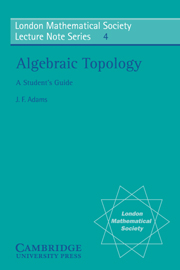Book contents
- Frontmatter
- Contents
- INTRODUCTION
- PAPERS ON ALGEBRAIC TOPOLOGY
- 1 Combinatorial homotopy
- 2 An axiomatic approach to homology theory
- 3 La suite spectrale. 1: Construction générale
- 4 Exact couples in algebraic topology
- 5 The cohomology of classifying spaces of H-spaces
- 6 Cohomologie modulo 2 des complexes d'Eilenberg-MacLane
- 7 On the triad connectivity theorem
- 8 On the Freudenthal theorems
- 9 The suspension triad of a sphere
- 10 On the construction FK
- 11 On Chern characters and the structure of the unitary group
- 12 Espaces fibrés et groupes d'homotopie. I, II
- 13 Generalised homology and cohomology theories
- 14 Relations between ordinary and extraordinary homology
- 15 On axiomatic homology theory
- 16 Characters and cohomology of finite groups
- 17 Extract from thesis
- 18 Relations between cohomology theories
- 19 Vector bundles and homogeneous spaces
- 20 Lectures on K-theory
- 21 Vector fields on spheres
- 22 On the groups J(X). IV
- 23 Summary on complex cobordism
6 - Cohomologie modulo 2 des complexes d'Eilenberg-MacLane
Published online by Cambridge University Press: 23 May 2010
- Frontmatter
- Contents
- INTRODUCTION
- PAPERS ON ALGEBRAIC TOPOLOGY
- 1 Combinatorial homotopy
- 2 An axiomatic approach to homology theory
- 3 La suite spectrale. 1: Construction générale
- 4 Exact couples in algebraic topology
- 5 The cohomology of classifying spaces of H-spaces
- 6 Cohomologie modulo 2 des complexes d'Eilenberg-MacLane
- 7 On the triad connectivity theorem
- 8 On the Freudenthal theorems
- 9 The suspension triad of a sphere
- 10 On the construction FK
- 11 On Chern characters and the structure of the unitary group
- 12 Espaces fibrés et groupes d'homotopie. I, II
- 13 Generalised homology and cohomology theories
- 14 Relations between ordinary and extraordinary homology
- 15 On axiomatic homology theory
- 16 Characters and cohomology of finite groups
- 17 Extract from thesis
- 18 Relations between cohomology theories
- 19 Vector bundles and homogeneous spaces
- 20 Lectures on K-theory
- 21 Vector fields on spheres
- 22 On the groups J(X). IV
- 23 Summary on complex cobordism
Summary
The next extract contains the major part of Serre's elegant and important paper on Eilenberg-MacLane spaces. The scope and usefulness of this paper has been explained in §7. This work is perhaps one of the main sources for the idea of ‘Universal example’ or ‘epresentablefunctor’ (see also the application of the same idea to homotopy summarised in paper 7). The paper is fairly selfcontained but it leans heavily on a theorem of A. Borel. For this, see the remarks and references in §6 plus Adams chap. 2, p. 11. The student might find the paper easier if he is familiar with homology theory before reading it; but equally, reading this paper would be a good way to acquire familiarity with homology theory.
Introduction
On sait que les complexes K (Π, q) introduits par Eilenberg-MacLane dans jouent un role essentiel dans un grand nombre de questions de topologie algébrique. Le présent article est une contribution à leur étude.
En nous appuyant sur un théorème démontré par A. Borel dans sa thèse, nous déterminons les algebres de cohomologie modulo 2 de ces complexes, tout au moins lorsque le groupe Π possède un nombre fini de générateurs. Ceci fait l'objet du § 2. Dans le § 3 nous étudions le comportement asymptotique des séries de Poincaré des algèbres de cohomologie précédentes; nous en déduisons que, lorsqu'un espace X vérifie des conditions très larges (par exemple, lorsque X est un polyèdre fini, simplement connexe, d'homologie modulo 2 non triviale), il existe une infinité d'entiers i tels que le groupe d'homotopie πi(X) contienne un sous-groupe isomorphe à Z ou à Z2.
- Type
- Chapter
- Information
- Algebraic TopologyA Student's Guide, pp. 79 - 100Publisher: Cambridge University PressPrint publication year: 1972



